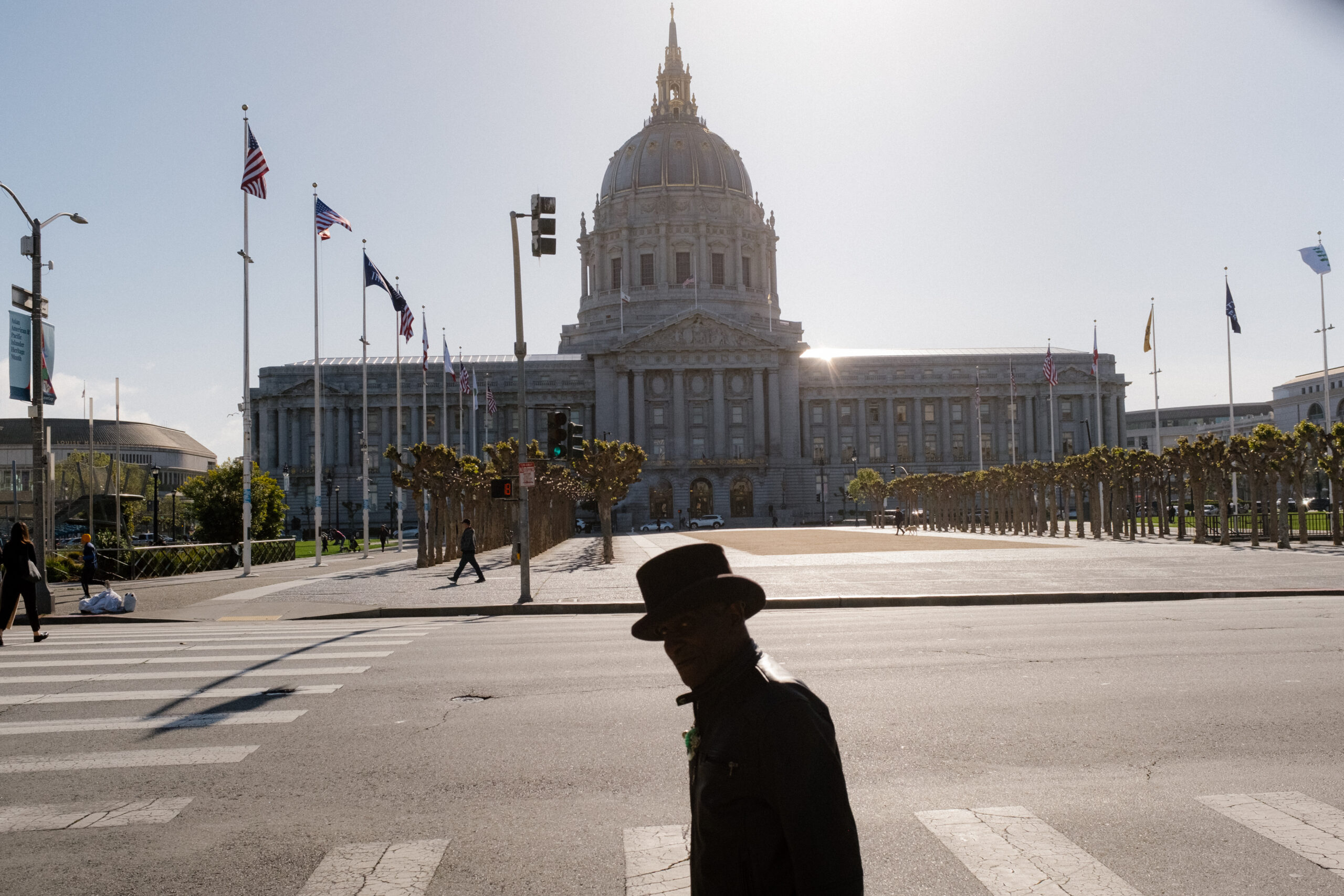An unusual plan to grill Mayor London Breed on the city’s drug crisis in an open-air forum Tuesday at United Nations Plaza—one of San Francisco’s worst drug hot spots—is moving forward in what could be must-see political theater.
Aaron Peskin, president of the Board of Supervisors, called for the board’s monthly Q&A session with the mayor to be held outdoors at U.N. Plaza to draw more attention to the city’s inability to adequately address drug-dealing and deadly overdoses.
But a lot could go wrong in what some City Hall insiders are calling a performative stunt. The public showdown requires coordination from numerous departments and staff, and no shortage of surprises could crop up in the outdoor plaza known for drugs and petty crime.
The Standard decided to take a closer look at the unprecedented hearing—the board was created in 1856, and city officials believe no meeting has ever been convened in such a fashion—as well as lay out who stands to win and lose in this political power struggle.
Get your popcorn ready!
Drugs Take Center Stage
On April 12, Peskin announced that a future meeting would be held at U.N. Plaza for the specific purpose of challenging Breed on her and the city’s record in confronting open-air drug-dealing. Drug overdoses claimed the lives of 1,908 people in San Francisco from 2020 through 2022, and more than 200 people have died from drug overdoses this year.
Police are expected to clear the area, and staff will set up tables and cameras to livestream the meeting starting at 2 p.m. Tuesday. Supervisors are allowed to question the mayor every month on a rotating basis, and this meeting will allow questions from representatives of Districts 1-4: Supervisors Connie Chan, Catherine Stefani, Peskin and Joel Engardio.
Engardio and Stefani said they do not plan to ask questions, while Chan said in a text message she supports the outdoor hearing.
“To be frank, we have conversations on tackling the public health crisis on our streets in City Hall daily, but it is critical for the public to witness our mayor and all 11 members of the Board of Supervisors having that very dialogue with U.N. Plaza as the backdrop,” Chan said.
Peskin said he intends to ferret out more details on how the city is working with the National Guard and California Highway Patrol to disrupt drug trafficking, especially around U.N. Plaza.
“It was declared a crisis, but we haven’t actually treated it like a crisis,” he said, adding that the city often pushes drug dealers to another corner without a long-term strategy.
Once the Q&A portion of the meeting is completed, supervisors and staff will return to City Hall to hold the rest of the regular weekly meeting.
This may seem like a spectacle for what’s normally a 15-minute affair, but Peskin said he might hold a second Q&A with the mayor at 16th and Mission streets—another known hot spot for drug activity. And he insisted it won’t be a “dog-and-pony show.”
“It’s about focusing the government and decision makers’ attention on how to effectively fix these spots,” Peskin told The Standard.
What Could Go Wrong?
Holding court at U.N. Plaza could quickly go off the rails for a variety of reasons, as there are risks on all sides in trying to hold the mayor’s feet to the fire in public.
One issue is whether this is a good use of taxpayer time and money. Peskin said his request to hold the meeting at U.N. Plaza will cost $4,650: $2,000 for the SF Gov TV equipment, $2,000 for “media services” and $650 for Board of Supervisors tablecloths.
Peskin said the pomp and circumstance will be worth it if it gets “neighborhoods the relief that has been long in coming.”
For her part, Breed seems unbothered by Peskin’s roadshow.
“The mayor is having conversations about public safety every day with residents, businesses, city leaders and partners, and she’s very comfortable having the conversation,” the Mayor’s Office said in a statement.
Of course, protesters in San Francisco are usually quick to strike, as recently seen by the outrage over District Attorney Brooke Jenkins’ decision not to file charges in the killing of Banko Brown. Despite any efforts to secure the location, it likely wouldn’t take much to disrupt a meeting that itself is trying to be disruptive.
Mayor Breed’s Rebuttal
U.N. Plaza has become a symbol to many of the city’s collective fecklessness in the face of the fentanyl epidemic. It was the site of the Tenderloin Center, which was initially pitched as a gateway for services but quickly evolved into a de facto safe consumption site. Facing criticism and legal scrutiny, the center closed down after 11 months.
Meanwhile, the “wellness hubs” designed to replace the Tenderloin Center have been stalled by concerns over how to pay for them without saddling the city with liability.
Breed’s defense Tuesday will likely note she has been calling for outside help since at least March 27, when she sent a letter to newly appointed U.S. Attorney Ismail Ramsey and cited a police shortage and the “sheer volume of drug dealing on our streets.”
The mayor also lobbied Speaker Emerita Nancy Pelosi, who issued a public statement urging Attorney General Merrick Garland to include San Francisco in Operation Overdrive, an initiative by the Drug Enforcement Agency to use “data-driven, intelligence-led approach to identifying and dismantling criminal drug networks.”
Since Jenkins took over as district attorney, police and prosecutors have been arresting and charging drug dealers at higher rates, respectively. But to many observers, those efforts still haven’t made much of a dent. Non-police initiatives like street ambassadors from Urban Alchemy may help in disrupting street deals by day, but the Tenderloin and other areas impacted by trafficking generally return to form by night.
The biggest question for Breed to answer is how the CHP and National Guard deployment will improve the areas most impacted by drugs. So far, details have been scant.
